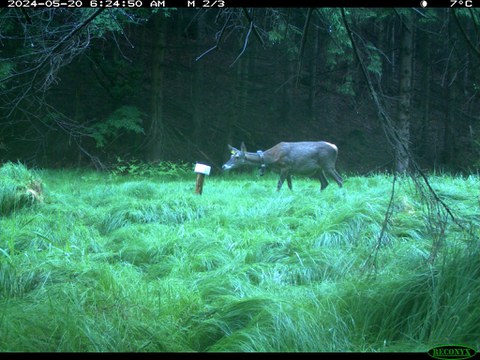Jun 21, 2024
Cross-border project for improved deer management in the Saxon and Bohemian Switzerland National Parks

Collared red deer "Oster-Ei" in Großen Zschand
A German-Czech research team has launched a joint project to investigate the influence of red deer and other ungulates on forest regeneration in national parks. In the project "Improving the effectiveness of red deer management through cross-border guidelines (REDEMA)", scientists from TU Dresden are working together with researchers from the Czech Agricultural University in Prague (ČZU) and the Senckenberg Gesellschaft für Naturforschung Görlitz as well as both national park administrations.
The red deer is the largest herbivore locally. The experts assume that its numbers are currently rising sharply in both national parks. As young forest trees are one of the deer's preferred foods, their proliferation can threaten the recovery of forests that have been severely weakened by drought, bark beetles and fires.
The researchers now want to tag a total of 30 red deer with telemetry collars in both national parks in order to gain insights into their activities and use of space. Another important focus is the determination of red deer densities. They also want to investigate what role wolves play in regulating the ungulate population and what influence hunting, tourism and deforestation have. Conversely, the influence of red deer on forest vegetation is also important. The new findings should help to improve wildlife management in the region.
The project is funded by the EU program Interreg Saxony - Czech Republic 2021-2027.
Contact
Vendula Meißner-Hylanová
TU Dresden, Chair of Forest Zoology
Phone: +49-173 9734265
Website
